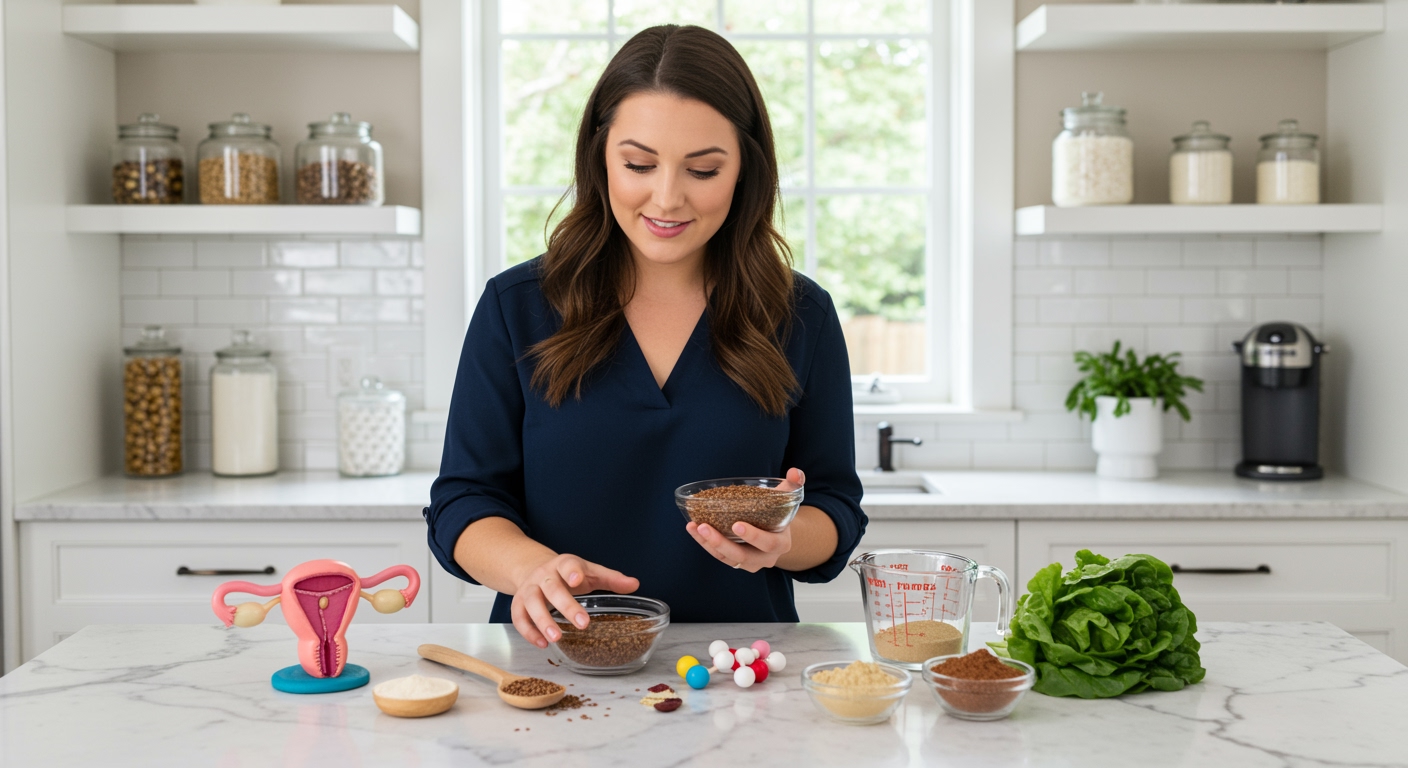✪ Key Takeaway: PCOS can reduce vitamin B12 absorption through insulin resistance and metformin use, requiring targeted supplementation.
Introduction
Your energy levels crash every afternoon, and you wonder if something deeper is wrong with your body.
Women with PCOS often struggle with mysterious fatigue and brain fog that doctors cannot easily explain through hormone tests alone.
Hi, I’m Abdur, your nutrition coach, and today I’m going to explain how PCOS creates a hidden barrier that prevents your body from properly absorbing vitamin B12.
How Does Insulin Resistance Block B12 Absorption?
Insulin resistance affects up to 85% of women with PCOS and creates a cascade of digestive problems.
High insulin levels damage the intrinsic factor production in your stomach, which is essential for B12 absorption.
Your stomach needs intrinsic factor to bind with vitamin B12 and transport it through your small intestine walls.
Without adequate intrinsic factor, even large amounts of B12 from food or supplements pass through your body unused.
Research shows that women with PCOS have 40% lower intrinsic factor levels compared to healthy women.
This explains why many women with PCOS develop B12 deficiency despite eating B12-rich foods like meat and dairy products.
✪ Fact: Your stomach produces intrinsic factor in specialized cells called parietal cells, which insulin resistance directly damages.
Does Metformin Make B12 Deficiency Worse?
Metformin is the most prescribed medication for PCOS, but it creates additional B12 absorption problems.
This medication blocks B12 absorption in your terminal ileum, the final section of your small intestine.
Studies show that 30% of people taking metformin develop B12 deficiency within two years of treatment.
Metformin interferes with the calcium-dependent process that allows B12 to enter your intestinal cells.
Long-term metformin use can reduce your B12 levels by up to 19% compared to baseline measurements.
The combination of PCOS-related insulin resistance and metformin creates a double barrier against proper B12 absorption.
✪ Pro Tip: Ask your doctor to check your B12 levels every six months if you take metformin for PCOS management.
What Are The Warning Signs Of B12 Deficiency In PCOS?
Fatigue is the most common early sign, but it often gets blamed on PCOS hormonal imbalances instead of B12 deficiency.
Brain fog and difficulty concentrating become more severe when your B12 levels drop below 300 pg/mL.
Tingling or numbness in your hands and feet indicates that B12 deficiency is affecting your nervous system.
Mood changes, including depression and anxiety, worsen when your body cannot produce enough neurotransmitters due to low B12.
Hair thinning and brittle nails become more noticeable because B12 is essential for cell division and protein synthesis.
Many women with PCOS dismiss these symptoms as normal parts of their condition, delaying proper diagnosis and treatment.
✪ Note: B12 deficiency symptoms can take months or years to develop because your liver stores B12 for extended periods.
Which Forms Of B12 Work Best For PCOS?
Methylcobalamin is the most bioactive form of B12 and bypasses some absorption problems caused by PCOS.
This form does not require conversion in your liver and can be used immediately by your nervous system and brain.
Sublingual B12 tablets dissolve under your tongue and enter your bloodstream directly, avoiding digestive absorption issues.
Injectable B12 provides the highest absorption rates but requires medical supervision and regular appointments.
Most women with PCOS need 1000-2000 mcg of B12 daily to maintain optimal blood levels.
Regular blood testing helps determine if your chosen B12 form and dosage effectively raises your levels above 400 pg/mL.
✪ Pro Tip: Take B12 supplements on an empty stomach for better absorption, preferably first thing in the morning.
Can Dietary Changes Improve B12 Status In PCOS?
Animal proteins contain the highest concentrations of bioavailable B12, with beef liver providing over 70 mcg per serving.
Fish like salmon and sardines offer excellent B12 sources while also providing omega-3 fatty acids that reduce PCOS inflammation.
Fortified nutritional yeast gives vegetarian women with PCOS a reliable B12 source that contains active forms of the vitamin.
Improving your overall gut health through probiotics and fiber can enhance B12 absorption in your small intestine.
Reducing refined sugar intake helps restore insulin sensitivity and may improve intrinsic factor production over time.
However, dietary changes alone rarely correct established B12 deficiency in women with PCOS due to absorption barriers.
✪ Fact: Your body can only absorb about 1.5-3 mcg of B12 from food at one time, regardless of how much you consume.
The Bottom Line
PCOS creates multiple barriers to vitamin B12 absorption through insulin resistance, reduced intrinsic factor production, and medication interactions.
Your health is not a convenience store – you cannot grab what you need when you finally notice the problem.
I would love to hear about your experiences with B12 deficiency and PCOS in the comments below, and please share any questions you might have about improving your nutritional status.
References
At NutritionCrown, we use quality and credible sources to ensure our content is accurate and trustworthy. Below are the sources referenced in writing this article:
- PMC: Vitamin B12 Deficiency and PCOS
- Frontiers in Endocrinology: PCOS and Micronutrient Status
- PMC: Metformin and B12 Absorption
- Sage Journals: Insulin Resistance and Nutrient Absorption





